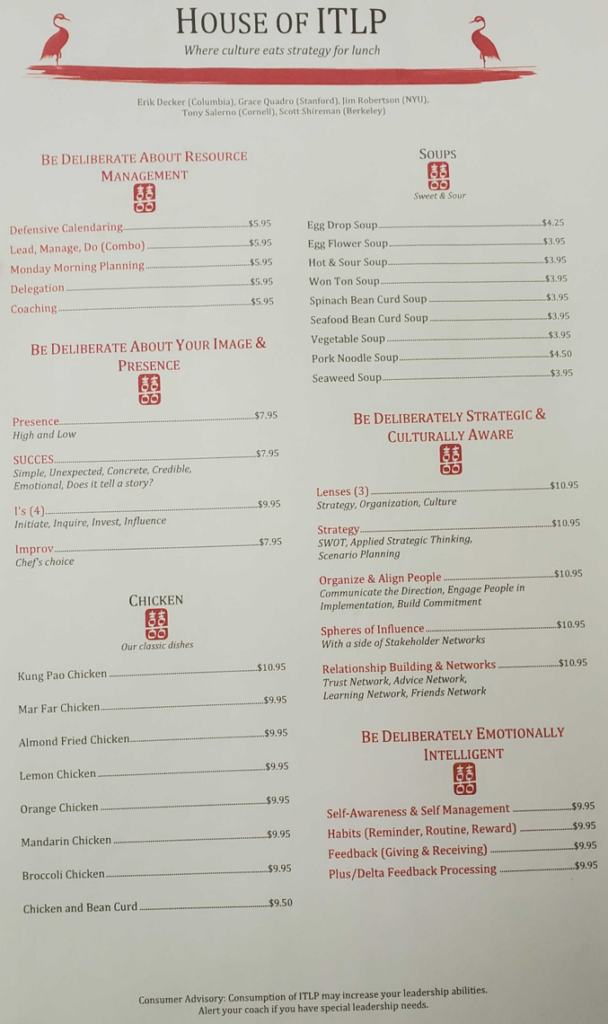10 Years of MOR: What Are You Still Serving?
by Debra Howell
Today’s Tuesday Reading is from Debra Howell, Director of IT Operations at the Cornell University Library. She is a 2013 MOR program graduate. Debra may be reached at [email protected] or via LinkedIn.
I realized I have been a MOR graduate for ten years in 2023! For our graduation, my cohort created a menu. I started reflecting on what I still serve off that menu ten years later:

(picture of “MOR Menu” produced by Debra’s MOR graduation cohort)
Reflecting on my 10-year journey since completing my MOR IT Leadership Program, I realize many “dishes” from our menu have helped shape my leadership style and achievements.
1. Be Intentional About Resource Management: This menu category has enabled me to optimize the allocation of people, time, and budget within my organization, improving productivity, streamlining processes, and achieving better outcomes. The dishes I serve in rotation are:
- Defensive Calendaring: 10 years later, I still have the first hour on Monday morning and the last 2-3 hours on Friday blocked off on my calendar. Monday is prioritizing my week, and Friday is wrapping up loose ends and spending time on strategy. This approach has helped me focus on critical tasks, reduce interruptions, and spend time on activities that align with our goals and priorities.
- Delegation: Delegation enables me to focus on higher-level responsibilities. By effectively delegating tasks and responsibilities, I have built a capable and motivated team, enhanced their skills, and created opportunities for them to shine. I took my first vacation this past summer since the pandemic: 3 weeks in Italy! People kept asking me, “How can you take three weeks off?!” like it was impossible. I always respond, “If my team can’t survive without me, then I am not doing my job.” One of the keys to doing my job is effective delegation so that my team can step in when I am not there and vice versa. I had a blissful vacation, and while they were happy to have me back, my team had an opportunity to showcase everything they knew!
- Coaching: I’m always looking for an opportunity to have a good coaching conversation, and I routinely seek coaching from people I respect. I value coaching so much that I am about to embark on the 60-credit International Coaching Federation (ICF) certification course to continue to hone my skills.
2. Be Intentional About Your Image & Presence: Developing a strong presence as a leader involves projecting confidence, authenticity, and credibility. My most influential dishes?
- 4 I’s: Utilizing the 4 I’s has significantly impacted my ability to build relationships and influence others. I eat this every day!
- Improv: Leadership as improv is my absolute wheelhouse. I can’t get enough. Yes, and! I find this especially useful when my team responds to a crisis or is resistant to change. I start with the phrase, “How might we…” For example, “How might we explore AI usage in IT and our unit?” This gentle phrasing takes some of the edge off. Then, as ideas bubble up, I say “Yes, and!” to get things going. This example resulted in a partnership with Amazon to host an AI showcase of how libraries use AI to support their missions. It’s an exciting outcome of a topic that initially generated fear.
3. Be Intentionally Strategic & Culturally Aware: Culture eats strategy for breakfast. Let’s eat! Menu highlights:
- Lenses & Strategy: Engaging people involves creating an inclusive and motivating environment where individuals feel valued, heard, and inspired. By adopting strategies to engage my team members, I have fostered a sense of ownership, increased morale, and cultivated a high-performing team committed to achieving shared goals. Recently, with a new University Librarian, we have been undergoing a strategic planning process. This began with creating individual unit plans. Since we routinely snack on lenses and strategy, my team dove into this exercise with pride and ownership. The resulting unit plan, which I initially thought would be a heavy lift for me, was created collaboratively and is a much better product than any I would have created solo.
- Relationship Building & Networking: Building and nurturing a solid professional network has significantly impacted my leadership journey. By actively engaging with colleagues, peers, mentors, and other professionals, I have expanded my sphere of influence and gained access to diverse perspectives and opportunities. Building relationships allows me to exchange knowledge, seek advice, collaborate on projects, and stay updated on industry trends. It has also opened doors for new partnerships, career advancements, and personal growth.
4. Be Intentional Emotionally Intelligent: Emotional intelligence has often been a challenging dish for me to swallow! MOR emphasized the importance of emotional intelligence in building solid relationships, managing conflicts, and fostering a positive work environment. Now, like dessert, I often eat emotional intelligence first!
- Self-Awareness: Self-awareness has enabled me to lead authentically, make sound decisions, and adapt my leadership style to different situations.
- Self-Management: Effective self-management allows me to stay composed, focused, and resilient in challenging situations. This area of emotional intelligence has always been the most difficult for me. I was struggling with building and maintaining relationships, especially with peers. My MOR coach recommended the book Crucial Conversations, and I read it on the plane to one of our cohort sessions. I had one of those moments where I’d been struggling with a problem, getting coaching on an issue, asking for help with the problem, and then I realized I was the problem. Ouch. But, it was a breakthrough in how my self-management weakness impacted my relationships with others. It profoundly changed my approach and helped me embrace the power of emotional intelligence.
- Habits: I have integrated practices like goal setting, time management, continuous learning, and self-reflection into my routine. I evaluate the impact of these habits on my productivity, well-being, and overall effectiveness as a leader.
- Feedback: It’s like eating your vegetables. You have to do it.
In the ten years since I graduated, I have been through several significant organizational changes, and through it all, I could hear Brian in my head saying, “Don’t run from something. Deliberately move towards your next best step/thing.” This coaching and the dishes on this menu have served me well. Thank you MOR Associates!

Whether you’re in your MOR experience now or you’ve been a graduate for ten years or more, what dish do you order most from the MOR menu?
Two weeks ago we asked how willing you are to move out of your comfort zone. Results from this Tuesday Reading audience, largely MOR program alumni, was:
· 11%, I’d rather not.
· 31%, I’m willing.
· 58%, No pain, no gain

We ask this same question on the front end of a MOR program, as part of the registration process to better understand one’s starting point. What we found interesting is the difference in scoring:
· 4%, I’d rather not.
· 76%, I’m willing.
· 20%, No pain, no gain.
These are meaningful shifts in the data. For our readers, it may be useful to reflect on how your MOR program experience supported you in testing the edges of your comfort zone in pursuit of further growth. We suspect there was some combination of Crossing the Bridge of Readiness, Taking a First Action, and being part of a Supportive Community that aided this evolution. It could be beneficial to periodically assess your leadership mindset, skillset, and toolset to ensure sustained intentionality in this area.
- July 2024 (4)
- June 2024 (4)
- May 2024 (4)
- April 2024 (5)
- March 2024 (4)
- February 2024 (4)
- January 2024 (5)
- December 2023 (3)
- November 2023 (4)
- October 2023 (5)
- September 2023 (4)
- August 2023 (4)
- July 2023 (4)
- June 2023 (4)
- May 2023 (5)
- April 2023 (4)
- March 2023 (1)
- January 2023 (4)
- December 2022 (3)
- November 2022 (5)
- October 2022 (4)
- September 2022 (4)
- August 2022 (5)
- July 2022 (4)
- June 2022 (4)
- May 2022 (5)
- April 2022 (4)
- March 2022 (5)
- February 2022 (4)
- January 2022 (4)
- December 2021 (3)
- November 2021 (4)
- October 2021 (3)
- September 2021 (4)
- August 2021 (4)
- July 2021 (4)
- June 2021 (5)
- May 2021 (4)
- April 2021 (4)
- March 2021 (5)
- February 2021 (4)
- January 2021 (4)
- December 2020 (4)
- November 2020 (4)
- October 2020 (6)
- September 2020 (5)
- August 2020 (4)
- July 2020 (7)
- June 2020 (7)
- May 2020 (5)
- April 2020 (4)
- March 2020 (5)
- February 2020 (4)
- January 2020 (4)
- December 2019 (2)
- November 2019 (4)
- October 2019 (4)
- September 2019 (3)
- August 2019 (3)
- July 2019 (2)
- June 2019 (4)
- May 2019 (3)
- April 2019 (5)
- March 2019 (4)
- February 2019 (3)
- January 2019 (5)
- December 2018 (2)
- November 2018 (4)
- October 2018 (5)
- September 2018 (3)
- August 2018 (3)
- July 2018 (4)
- June 2018 (4)
- May 2018 (5)
- April 2018 (4)
- March 2018 (5)
- February 2018 (5)
- January 2018 (3)
- December 2017 (3)
- November 2017 (4)
- October 2017 (5)
- September 2017 (3)
- August 2017 (5)
- July 2017 (3)
- June 2017 (8)
- May 2017 (5)
- April 2017 (4)
- March 2017 (4)
- February 2017 (4)
- January 2017 (4)
- December 2016 (2)
- November 2016 (7)
- October 2016 (5)
- September 2016 (8)
- August 2016 (5)
- July 2016 (4)
- June 2016 (12)
- May 2016 (5)
- April 2016 (4)
- March 2016 (7)
- February 2016 (4)
- January 2016 (10)
- December 2015 (4)
- November 2015 (6)
- October 2015 (4)
- September 2015 (7)
- August 2015 (5)
- July 2015 (6)
- June 2015 (12)
- May 2015 (4)
- April 2015 (6)
- March 2015 (10)
- February 2015 (4)
- January 2015 (4)
- December 2014 (3)
- November 2014 (5)
- October 2014 (4)
- September 2014 (6)
- August 2014 (4)
- July 2014 (4)
- June 2014 (4)
- May 2014 (5)
- April 2014 (5)
- March 2014 (5)
- February 2014 (4)
- January 2014 (5)
- December 2013 (5)
- November 2013 (5)
- October 2013 (10)
- September 2013 (4)
- August 2013 (5)
- July 2013 (8)
- June 2013 (6)
- May 2013 (4)
- April 2013 (5)
- March 2013 (4)
- February 2013 (4)
- January 2013 (5)
- December 2012 (3)
- November 2012 (4)
- October 2012 (5)
- September 2012 (4)
- August 2012 (4)
- July 2012 (5)
- June 2012 (4)
- May 2012 (5)
- April 2012 (4)
- March 2012 (4)
- February 2012 (4)
- January 2012 (4)
- December 2011 (3)
- November 2011 (5)
- October 2011 (4)
- September 2011 (4)
- August 2011 (4)
- July 2011 (4)
- June 2011 (5)
- May 2011 (5)
- April 2011 (3)
- March 2011 (4)
- February 2011 (4)
- January 2011 (4)
- December 2010 (3)
- November 2010 (4)
- October 2010 (4)
- September 2010 (3)
- August 2010 (5)
- July 2010 (4)
- June 2010 (5)
- May 2010 (4)
- April 2010 (3)
- March 2010 (2)
- February 2010 (4)
- January 2010 (4)
- December 2009 (4)
- November 2009 (4)
- October 2009 (4)
- September 2009 (4)
- August 2009 (3)
- July 2009 (3)
- June 2009 (3)
- May 2009 (4)
- April 2009 (4)
- March 2009 (2)
- February 2009 (3)
- January 2009 (3)
- December 2008 (3)
- November 2008 (3)
- October 2008 (3)
- August 2008 (3)
- July 2008 (4)
- May 2008 (2)
- April 2008 (2)
- March 2008 (2)
- February 2008 (1)
- January 2008 (1)
- December 2007 (3)
- November 2007 (3)
- October 2007 (3)
- September 2007 (1)
- August 2007 (2)
- July 2007 (4)
- June 2007 (2)
- May 2007 (3)
- April 2007 (1)
- March 2007 (2)
- February 2007 (2)
- January 2007 (3)
- December 2006 (1)
- November 2006 (1)
- October 2006 (1)
- September 2006 (3)
- August 2006 (1)
- June 2006 (2)
- April 2006 (1)
- March 2006 (1)
- February 2006 (1)
- January 2006 (1)
- December 2005 (1)
- November 2005 (2)
- October 2005 (1)
- August 2005 (1)
- July 2005 (1)
- April 2005 (2)
- March 2005 (4)
- February 2005 (2)
- December 2004 (1)